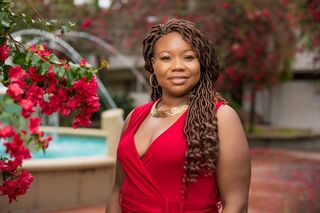Health
Social Justice and Black Mental Health
Interview with LaDonna Butler of The Well for Life.
Posted February 1, 2022 Reviewed by Vanessa Lancaster
Key points
- LaDonna Butler discusses a safe space in Florida for the healing minds, bodies, and spirits of Black, Indigenous, and people of color (BIPOC).
- Butler focuses on creating the conditions that allow BIPOC communities to experience our full humanity.
- Butler's focus is on creating the conditions that allow BIPOC communities to experience our full humanity.
I had the privilege of speaking with LaDonna Butler, the founder of Well For Life, LLC, based in St. Petersburg, Florida.

ML: Tell me about The Well for Life’s beginning and your role within the organization.
LB: The Well for Life is a healing space. We were created in 2017 because I needed a space. I was completing my dissertation in counselor education and supervision and working at a social justice organization, helping to leverage the conversation around mental health and faith-based communities and what our committed actions were.
So I was leading that project. I received my first opportunity to work full-time at a research university all at the same time. I realized I needed a place for me. The Well was conceived as a healing space for me as a provider of color, who’s also a leader and trainer heavily invested in community and needed a place to organize my own thinking.
Three things happened. It’s a place to heal, co-create, and serve. That was the impetus of The Well, whether you’re an individual needing formal services like individual or group therapy and family therapy, or you’re a provider and need a place to provide support for clinical practice, or if you’re a student who needs a place for internships and practicum, or a person interested in well-being.
We have a center for clinical therapy. We have a collaborative of people. Last we have our institute where we learn so we can serve in a meaningful way.
The Importance of Social Justice in the Healing Process
ML: We need to heal mind, body, spirit. There are few, if any, places that have space and ability to address all those different areas. Tell me about healing and the social justice. How did those things come together?
LB: As a people, we can’t find real healing without the conditions that allow us to experience our full humanity. There cannot be any true mental health without addressing the social ills that cause disease in bodies that have not been seen as fully human.
ML: You’re giving me goosebumps.
LB: A part of what we know from Maslow is we need to have our basic, physical needs met. However, it’s only part of being part of a collective that also has its needs met. We need to be well enough so that we can meaningfully take care of the group of people we’re most connected with. We’ve segmented ourselves from mind, body, and spirit. We are only complete when we attend to all these things.
As we take care of our physical bodies, it’s important that we’re seen as our own complete selves. We also need to be affirmed, held as valuable, and seen as able to make meaningful contributions. Those are our greatest needs. We know from research that if babies are only fed and not held or touched, the babies still die. The same thing is true for adults. We need each other to be seen, heard, held, and valued.
ML: When you put healing and Abraham Maslow’s hierarchy of needs1 in context with social justice, and I think of the basic needs: food, shelter, and clothing, any animal needs those things, too. We are beyond that.
LB: However, there are conditions that prevent our access to food, i.e., food deserts2; to access shelter, i.e., redlining3 and the ongoing impact of redlining and laws that say we can’t live in certain communities; and access to clean water, where climate change is real and so is the way we’re taking care of our communities.
Even at the basics of Maslow, we have to have justice to make sure we have equitable access to those resources. Without social justice, there can’t be true wellness for any of us because if any of us is sick, we can’t all benefit from the meaningful contributions that we all can share.
ML: Amen. What kind of challenges are Black, Indigenous, and people of color (BIPOC) people with mental illness facing when it comes to living independently?
LB: Individuals living in marginalized bodies that haven’t been fully seen want to hold onto their dignity and strength while also balancing out what it means to be fully human. Every person desires to be seen, held, and valued without conditions that say they’re not enough.
When you are constantly fed messages around your inhumanity or magical-ness—which still detracts from the essence of one's true humanity—it makes it difficult to ask for help in a meaningful way.
I had the benefit of growing up in a strong Black family that prided itself on faith, the understanding that the more we contributed to our community, it aids our well-being.
Yet, in our family, there was shame that came from misunderstanding true vulnerability. In all communities that are not seen as fully human and valuable, there’s a stigma when we’re meeting the negation of our true value. Stigma is real and it can be reduced as we normalize asking for help.
Recognizing the Script of Stigma
ML: What does stigma sound like? How does it manifest.
LB: "I don’t want to prove them right." "If I ask for help, they’ll never believe I’m strong enough." "I’m not enough." "If I’m crazy, I might lose everything that my family has worked for."
ML: That’s a big one. They falsely believe they stand to lose if they reach out for help and get labeled “crazy” because labels tend to stick.
LB: That’s a beautiful point that no one wants to be labeled or to feel defective. Mental illness, just like physical illness, is something we learn to manage and be in relationship with, so we can meet our purpose. It’s a health condition and people can still live independently and make their families proud. We are whole and complete human beings. Beyond stigma, we elevate and normalize what it means to live in our full humanity.
ML: Where can readers connect with The Well for Life and get involved with your mission?
LB: We have a lot of programs, The Center for Trauma Recovery, Well-being, and Healing Justice, and conversations lined up. We’re building a network of providers and people who care to serve as peers.
References




